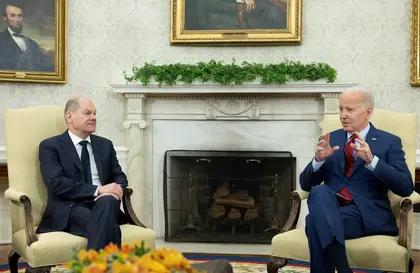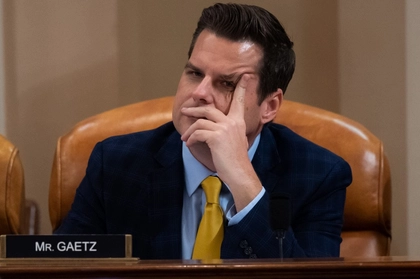German Chancellor Olaf Scholz will try to build on the momentum from Europe’s success in agreeing new aid for war-torn Ukraine when he heads to Washington this week, where President Joe Biden is struggling to overcome opposition to a US package.
The leaders’ talks Friday will also focus on escalating tensions in the Middle East, where Israel is fighting a war against Hamas and where the US has launched strikes on Iran-linked targets in Iraq and Syria following a drone attack that killed three American soldiers at a Jordanian base.
JOIN US ON TELEGRAM
Follow our coverage of the war on the @Kyivpost_official.
The United States is Kyiv’s biggest military backer, and Germany its second biggest, and the Biden-Scholz meeting comes almost two years since Russia launched its invasion of Ukraine.
Along with other countries, Washington and Berlin have sent a vast array of weapons and other support to Kyiv. But the conflict has become bogged down and doubts are growing about further aid from Kyiv’s Western backers, which would be a boost for Russian President Vladimir Putin.
In the United States, a White House request for about $60 billion for Kyiv has been blocked by Republicans who are insisting on increased border security in return for approving it.
Former president Donald Trump, who is running for re-election and is desperate to avoid Biden getting a legislative win, has spoken out against the bill.
This stands in contrast to Europe, where EU leaders last week agreed 50 billion euros ($54 billion) of aid for Ukraine, overcoming months of opposition from Hungarian leader Viktor Orban.

‘Cannot Be Treated Seriously Yet’ – Expert on New US Provision of Antipersonnel Mines to Ukraine
After the deal was struck, Scholz voiced hope it could assist Biden in overcoming the impasse in the US Congress.
- War fatigue -
Asked Friday whether Scholz would press US lawmakers on the package while in Washington, German government spokesman Steffen Hebestreit said the “chancellor will certainly use this trip to enter into dialogue with both the Senate and the House of Representatives”, without giving further details.
In Washington, a senior White House official said there would be “no pressure campaign” for Scholz to “deliver any particular message”, when asked whether the chancellor would be pressed to try to persuade US Congressional leaders on the Ukraine aid.
The official, speaking anonymously, added that “should the chancellor feel that that’s a part of the discussions that he wants to have while he’s in Washington, that will be up to him”.
Ursula Muench, director of the Academy for Political Education in Tutzing, southern Germany, told AFP that Scholz would seek to emphasise that supporting Ukraine is “not just a task for the United States, but also the European Union”.
She added that Scholz, from the centre-left SPD party, must also try to talk to Republicans to convince them Russia is not solely an “enormous security threat” to Europe.
While the picture in Europe is more encouraging for Kyiv, there are also signs of growing fatigue as the war grinds on.
The EU’s foreign policy chief Josep Borrell admitted last week that the bloc would supply Ukraine with just over half of the one million artillery shells it promised to send by March.
Accusations have been levelled at countries such as France, Italy and Spain that they are not pulling their weight, while even Germany has come under fire for refusing to provide long-range missiles sought by Kyiv.
- ‘Regional escalation’ -
At Friday’s talks, the leaders will also discuss “efforts to prevent regional escalation in the Middle East,” White House Press Secretary Karine Jean-Pierre said ahead of the visit.
Regional tensions were ratcheted up by the death of the American soldiers in Jordan at the end of January, marking the first US military losses to hostile fire in the region since the Israel-Hamas war broke out on October 7.
Biden blamed Tehran-aligned groups, and Washington on Friday launched deadly strikes on Iran-backed forces in Syria and Iraq, drawing sharp condemnation from the region.
Germany has steadfastly backed Israel and its right to self-defence but has also repeatedly warned of the dangers of a wider regional conflict, while stepping up calls for more humanitarian aid to reach the war-ravaged Gaza Strip.
You can also highlight the text and press Ctrl + Enter






